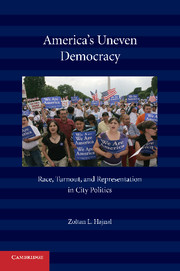Book contents
- Frontmatter
- Contents
- Acknowledgments
- America's Uneven Democracy
- Introduction
- 1 Where Turnout Should Matter
- 2 Turnout Could Matter at the Local Level
- 3 Winners and Losers in Mayoral Elections
- 4 Turnout and Representation on City Councils
- 5 Turnout and Local Government Spending Priorities
- 6 Raising Voter Turnout
- 7 The Broader Implications of Uneven Turnout
- Appendix
- Bibliography
- Index
2 - Turnout Could Matter at the Local Level
Published online by Cambridge University Press: 05 June 2012
- Frontmatter
- Contents
- Acknowledgments
- America's Uneven Democracy
- Introduction
- 1 Where Turnout Should Matter
- 2 Turnout Could Matter at the Local Level
- 3 Winners and Losers in Mayoral Elections
- 4 Turnout and Representation on City Councils
- 5 Turnout and Local Government Spending Priorities
- 6 Raising Voter Turnout
- 7 The Broader Implications of Uneven Turnout
- Appendix
- Bibliography
- Index
Summary
In the last chapter I suggested that existing studies have generally been looking in the wrong place for evidence that turnout matters. If uneven turnout leads to skewed outcomes at any level in American democracy, it is likely to be at the local level. In this chapter I begin to investigate this possibility. The goal here is not to show that turnout matters at the local level. Rather, the purpose of this chapter is simply to show that turnout could matter there.
For turnout to matter at any level, three conditions are necessary. First, turnout must be skewed. Some groups must participate less than other groups. This, I suggested, was more likely at the local level where turnout is exceptionally low. Second, groups that vote less must have different preferences from those that vote more. Only if nonvoters favor different choices can their entry into an electoral contest affect the outcome. Whether these kinds of divisions are greater at the local level than other levels is unclear. Third, and finally, the groups who vote less regularly must be large enough to have a say if they did vote. I suggested that this is also a condition that is more likely at the local level given the uneven geographic distribution of the population. In the cities where minorities actually live, they should make up a substantial portion of the electorate and should be large enough to at least theoretically help determine the outcome of the election.
- Type
- Chapter
- Information
- America's Uneven DemocracyRace, Turnout, and Representation in City Politics, pp. 34 - 47Publisher: Cambridge University PressPrint publication year: 2009



